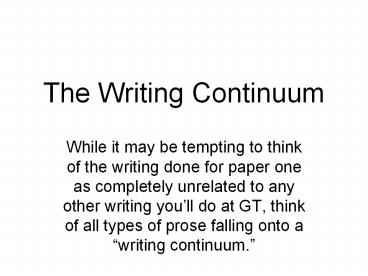The Writing Continuum - PowerPoint PPT Presentation
1 / 12
Title:
The Writing Continuum
Description:
The Writing Continuum While it may be tempting to think of the writing done for paper one as completely unrelated to any other writing you ll do at GT, think of all ... – PowerPoint PPT presentation
Number of Views:51
Avg rating:3.0/5.0
Title: The Writing Continuum
1
The Writing Continuum
- While it may be tempting to think of the writing
done for paper one as completely unrelated to any
other writing youll do at GT, think of all types
of prose falling onto a writing continuum.
2
On one end of the continuum, we have open form
prose.
- Open form
- Narrative-based prose
- This side of the continuum is less concerned with
getting a specific point across as much as it is
with sharing an event or experience, conveying an
emotion, telling a story, etc.
3
On the other end of the continuum, we have
closed form prose.
- Closed form Open
form Thesis-driven prose - This side of the continuum is more concerned with
delivering a point and proving that point through
research, evidence, logical arguments etc. All
points in closed-form prose directly advance
central thesis. This prose is very rigidly
structured. (Ex. There are three reasons why
windpower is untenable A, B, and C. One
paragraph is dedicated to each of these three
reasons.)
4
Most forms of writing fall somewhere in between
these two extremes on the continuum.
- Closed Implied thesis prose Open
- Sometimes writers imply a thesis/argument. The
persuasive purpose of the paper is still there,
but the position the author is trying to convince
her or his audience of is not explicitly stated,
and may often be complex.
5
Authors chose their form based on their purpose
for writing, their choice of topic/type of
argument, and the audience whom the author
imagines is going to read the text.
- Closed Delayed thesis Implied thesis Open
- When authors employ a delayed thesis style, the
thesis statement is still made explicit for the
reader, but is not stated until after some if not
all of the evidence has been presented. Authors
chose this form for very controversial topics or
if they imagine a very skeptical audience.
6
Where would you place the essays weve read thus
far this semester?
- Davis?
- Poole?
- Roundtable discussion?
7
Youll note that what seemed to be the defining
element for the essay type was the thesis
statement.
- What is a thesis? Is it all that different from a
topic? What is a thesis statement supposed to do?
Where should it go?
8
Lets have a running definition of a thesis
statement. A thesis statement
- is an answer to a question we know to be both
problematic and significant. (This is why paper 1
is so important-- one long exercise in practicing
the work necessary to create a thesis statement.) - takes risks in that people could disagree with it
or that it could be proven wrong. - creates tension in that it surprises and
simultaneously challenges the reader with a
thought they might not have considered. - when given early in the essay forecasts the
direction for the rest of the document and lets
readers know what to expect.
9
What is the difference between a topic and a
thesis?
- While a topic also might forecast the direction
for the rest of the document, topics do not take
risks because they do not engender disagreement. - Also, while topics may hint at surprising
information, they do little to create tension if
they do not show how that new info changes how a
given idea should be viewed.
10
How can we take these following statements that
do not take risks and turn them in to strong
thesis statements?
- The Space Shuttle Challenger disaster was an
event that altered the US space program. - The advent of locomotive technology had a big
impact on American culture. - There are some good and bad things about credit
cards. - There are many reasons why local governments are
deciding to add bicycle lanes to their roads.
11
- Although the Challenger disaster was a horrible
event that saddened an entire nation, the lessons
learned from NASAs mistakes in the incident have
proved valuable. - Although many people would readily admit that the
locomotive was an invention that brought more
regions of America together in closer contact,
research suggests that it had a devastating
impact within those communities themselves. - While seemingly everyone in the US has
demonstrated a preference for spending on credit
versus using hard currency in business
transactions , research shows that this
enthusiastic trust in credit systems as a means
of payment is unwarranted.
12
Note that each one of these examples employs a
surprising reversal formula
- creates tension by invoking a common view or
innocuous view within itself. - hints at how it plans on expanding that common
view - could be proven wrong. The reader wont know for
sure until the evidence has been presented.

